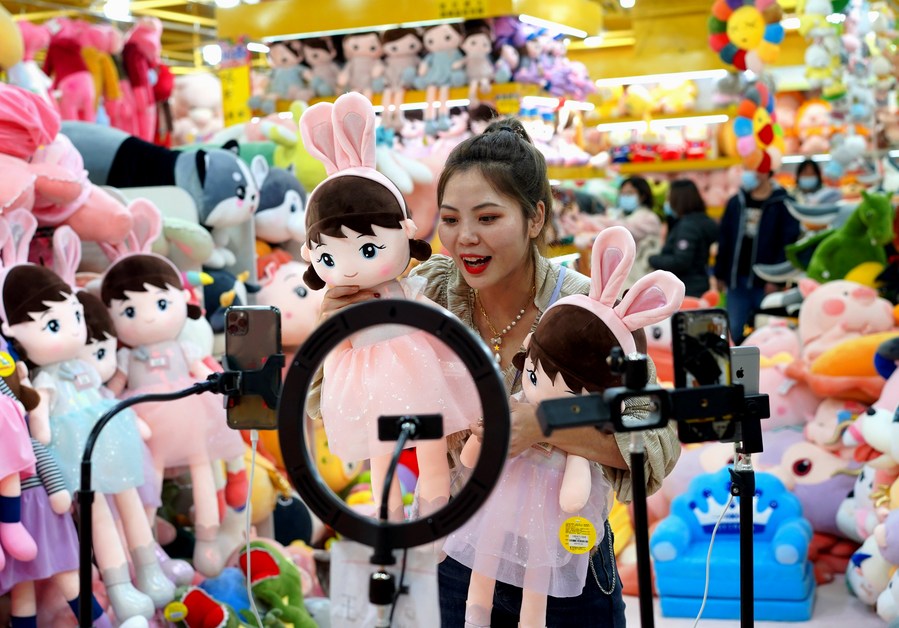E-commerce livestreaming drives sales of Chinese domestic brands
In recent years, increasingly more Chinese consumers, especially younger consumers, have gradually picked up the habit of placing orders through live streaming platforms, which has greatly helped boost the sales of Chinese domestic brands.

A saleswoman promotes stuffed toys via livestreaming at an international trading center in Baigou New Township, Baoding City of north China's Hebei Province, Feb. 2, 2021. (Photo by Feng Yun/Xinhua)
As of June 2021, nearly 40 percent of China's cyber citizens had already become e-commerce users, according to the 48th set of statistics released by the China Internet Network Information Center.
China’s domestic brands are now striving to tap the potential of livestreaming marketing. Consumers are rushing to purchase the products of time-honored domestic brands, including Bee & Flower, an old soap brand in Shanghai founded in 1928. Hashtags on news revealing that “Bee & Flower was subject to no penalty in the 36 years after its establishment,” in addition to “Bee & Flower’s response to rumors of possible bankruptcy,” recently became trending items on China’s Twitter-like Weibo platform.
Thanks to the successful advertising campaign, 20,000 orders were placed for Bee & Flower products in merely one day, which is an equivalent to the normal sales volume for the brand in a one-month period. Many netizens commented that “I love time-honored domestic brands! They not only offer high quality and inexpensive products, but can take advantage of social media marketing.”
Afterwards, the Weibo account of Bee & Flower posted a humorous thank you note to online users, attaching a picture of a personal conversation between it and other new or well-known domestic brands. “As a young person, I like this way of interaction with consumers, and I feel that these old domestic brands are actually young at heart,” said Chen Xi, a post-00s college student from Shanghai.
The enthusiasm of young consumers for domestic products now runs so high that it may lead to irrational consumption, said Zhou Yuanzhu, director of the Shanghai Institute of Corporate Culture and Brand.
In addition to Bee & Flower, Chinese skincare brand Zhuben founded about five years ago, has also benefited from the fast development of emerging sales channels represented by live streaming.
Liu Qianfei, founder of Zhuben, recalled that at the beginning of the establishment of her company, sales of her products stalled, and others engaged in the industry sometimes advised her: "Your products are of high quality. Why not register a foreign trademark, and then import the products to China? They will sell well."
Fortunately, sales of Liu’s products in the field of makeup remover oil increased rapidly when she sought to take advantage of livestreaming marketing. During the Double Eleven shopping festival in 2021, sales of Zhuben products on the Internet exceeded 280 million yuan, of which the turnover for them via e-commerce website Taobao’s subsidiary Tmall reached 180 million yuan, an increase of 468 percent over the same period 2020.
After its products gained wide popularity among online consumers, Zhuben gradually engaged in independent research and development (R&D) and started to control its own supply chain. It has been reported that the brand has established an independent R&D laboratory in Shanghai, independently developed product formulations, as well as establishing direct raw material procurement relationships with suppliers from many countries and regions, thus taking full control over its supply chain.
"The experience of shopping through live streaming platforms is much better than that of traditional offline shopping. For example, when introducing a product, the host can quickly help me know the key points... so that I can not only buy something more suitable for myself, but also shorten my decision-making time during shopping," explained Li Lei, a post-00s consumer who works in Shanghai's Caohejing Development Zone, indicating the advantages of shopping through livestreaming platforms.
Photos
Related Stories
- Village official takes up livestreaming to sell locally grown dragon fruits in S China’s Hainan
- Firefighters-turned-influencers from Xinjiang create safety awareness through livestreaming
- China tightens regulations on livestreaming agents
- British vlogger decodes how livestreaming e-commerce boosts China's rural development
- Ministry mulls regulations to stop dishonest practices by livestreaming industry agents
- China's livestreaming service users reach 617 million in 2020: report
Copyright © 2022 People's Daily Online. All Rights Reserved.










